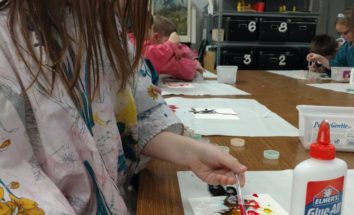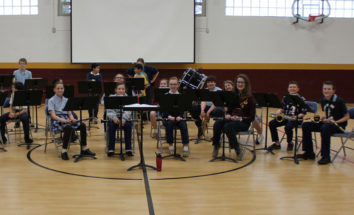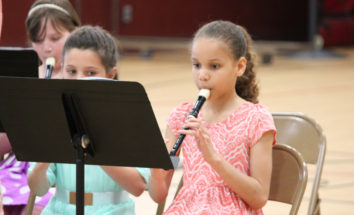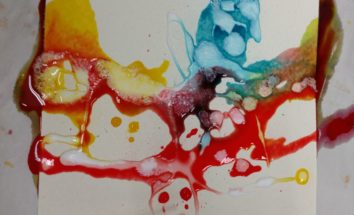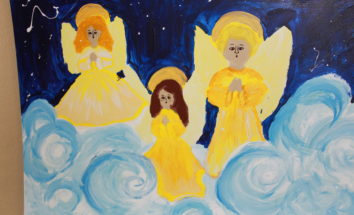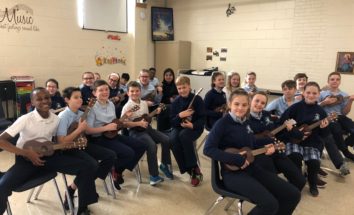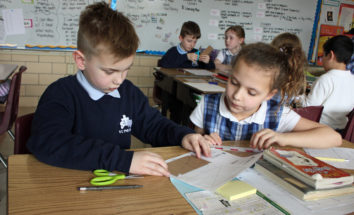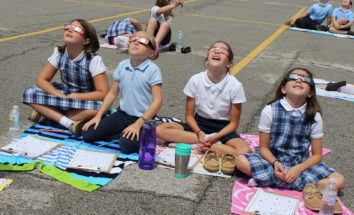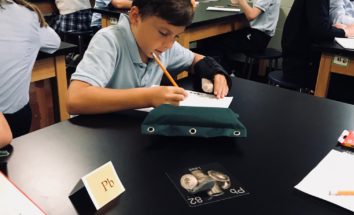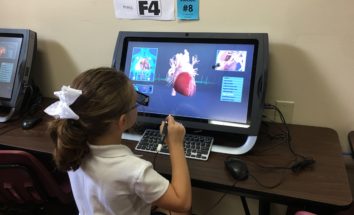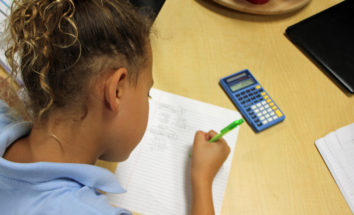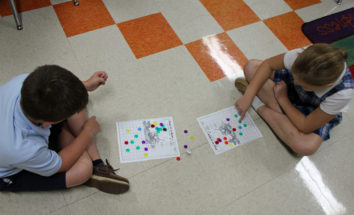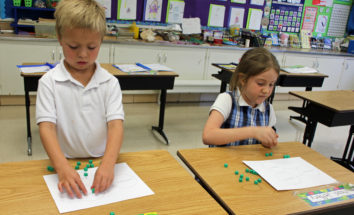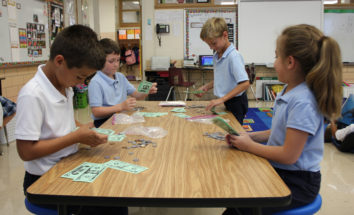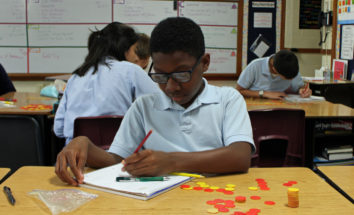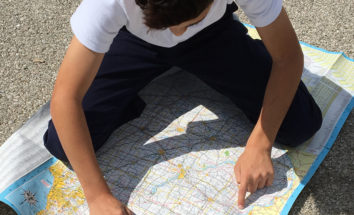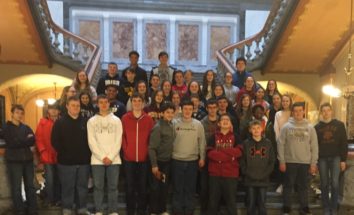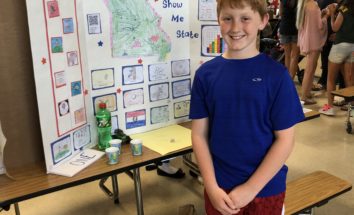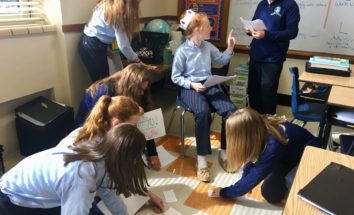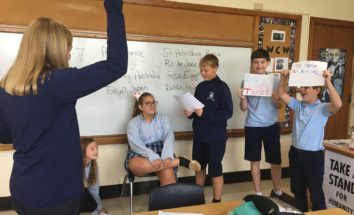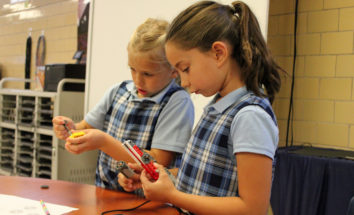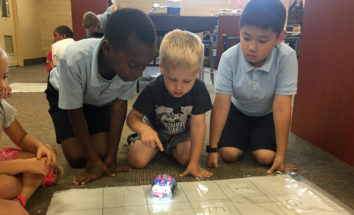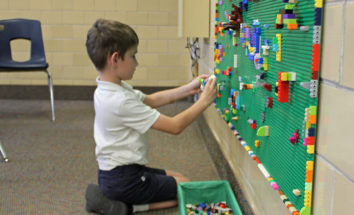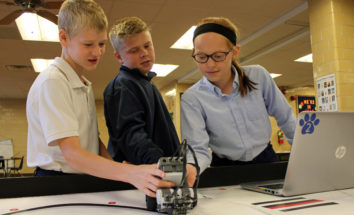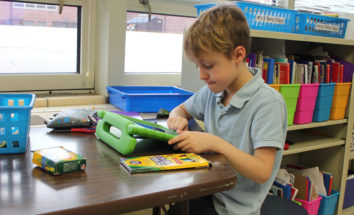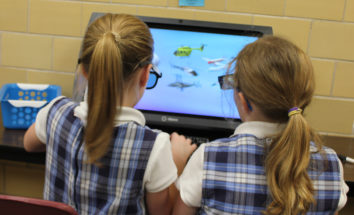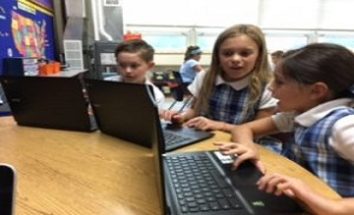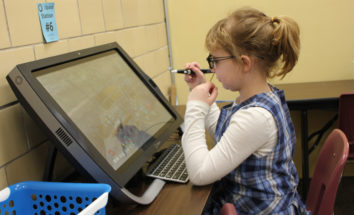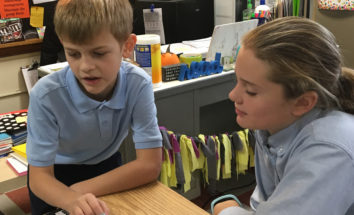The Elementary Curriculum: Always a Work in Progress
The goal of our instructional program is to produce individuals, anchored in Christ, who demonstrate great character and great competence in service to their parish, local, and/or global communities. We want to produce students who actively and joyfully bring faith to life and life to faith.
Our challenge is to design and implement a viable current curriculum embedded in our Catholic faith; a curriculum that equips our students with the knowledge and skills necessary to successfully negotiate a complex and unknown future. Not only do our students need to know how to analyze information or circumstances they have never seen before and then know what to do next; but they also need to know how to keep learning and adapting as content and circumstances continue to change with an accelerating pace. To do so requires us to continually examine both what we teach, how we teach, and how effectively we teach, constantly adjusting to the strengths and needs of the students we serve.
Character is critical. That is where we begin to build a strong instructional program. With Christ as our model, we work to prepare our students for global citizenship with a continuous focus on character development. Both explicitly and implicitly embedded, throughout our daily instructional program, activities help our students understand and acquire, through a Catholic lens, the habits of mind that develop integrity, responsibility, initiative, and perseverance. It all begins in kindergarten where we start with the guiding principle…. “Always do the right thing…even when no one is looking.”
Competence is essential. Competence results from mastery of a relevant and engaging instructional program comprised of knowledge and skills from the traditional core content areas, as well as knowledge and skills from areas not typically associated with an elementary instructional program. For our students to be competent in today’s complex global community, we must expand our instruction to include and integrate the knowledge and skills associated with learning and innovation; information, media, and technology; life and career. We seek to help students understand the “big ideas” or “enduring understandings” that connect and cross disciplines. Once understood, students can use these “big ideas” and “enduring understandings” for problem solving purposes. We work diligently to incorporate these new areas of learning into the core content areas as we build on the longstanding Catholic tradition of academic excellence.
Curriculum design and implementation is always a work in progress. So too is ours. For a closer look at the specifics of our curriculum click on the view more tabs. Christian character, competence, and instilling a desire and skill set to serve the community, be it parish, local and/or global, drive our instructional program.
Faith Formation
As a faith community, the students and staff at St. Philomena School are active participants in the sacramental life of the Church and daily support one another on their spiritual journey.
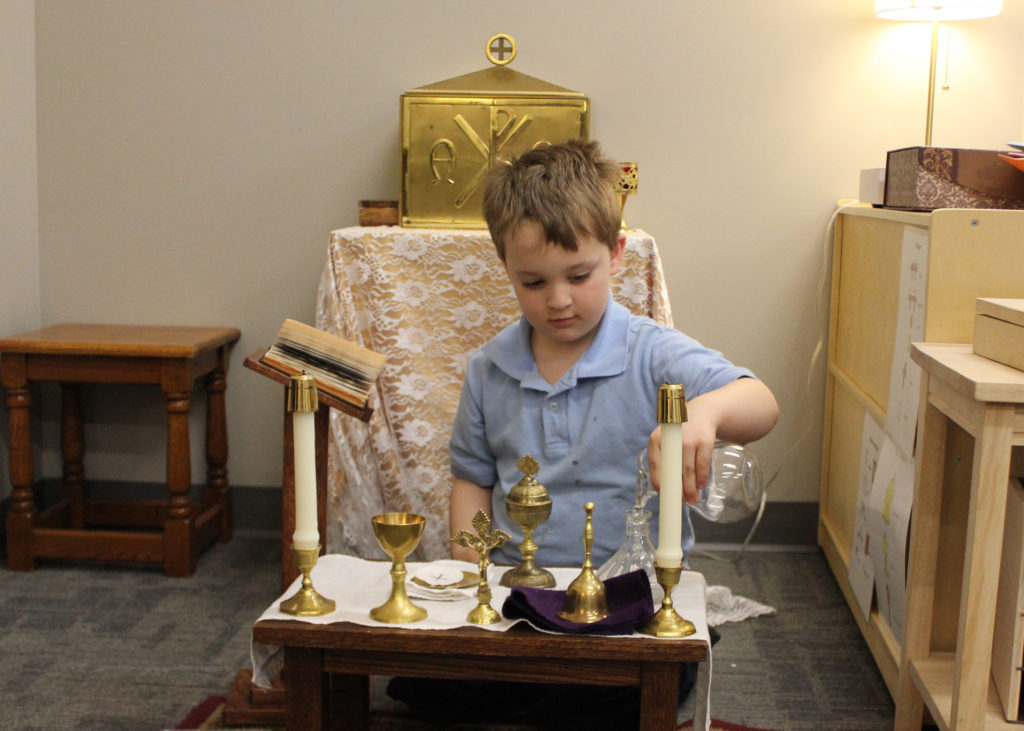
The curriculum used in our school presents the truths of the Catholic Faith found in Sacred Scripture and Tradition, and is in accordance with the Magisterium of the Church. The Sacraments, most especially the Eucharist, are the source and strength of the Catholic community and are essential to the life and mission of the Church and its members. The Sacrament of Reconciliation and the Sacrament of the Eucharist are celebrated in the 2nd grade. Preparation is ongoing throughout the 2nd grade year, and culminates with an age-appropriate Jesus Day retreat for our students the week before receiving Jesus for the first time in the Eucharist. The Sacrament of Confirmation is conferred to students in the 8th grade. Preparation is also ongoing throughout the year, intensifying in the second semester. The confirmandi participate in a Signing of the Senses Mass and make a full-day, off-site retreat during the week before their Confirmation date. Students also are required to perform service work for the community. Finally, the Sacrament of Reconciliation is celebrated weekly for students in Grades 3 through 8 on a rotating schedule by grade. By virtue of their Baptism, all Catholics are called to discipleship that is manifest in loving service to others. Each grade level performs works of service within our faith community and the community at-large. Prayer is essential to the formation of our students in the faith. Through God’s initiative, students are exposed to diverse expressions of prayer, including traditional Catholic forms of prayer. We gather as a faith community each Friday for school Mass, where our Children’s Choir provides music, and students take an active role in the Liturgy.
Fine Arts
At St. Philomena School, visual and performing arts are experienced at all grade levels.

Fine Arts
Our goal is that exposure to the fine arts teaches each and everyone of our students to see the world around them in a new light. The arts communicate our Catholic faith and values along with our feelings, visions, hopes, and dreams. Teaching the arts, we believe, helps our children reach their greatest potential. St. Philomena Fine Arts program includes both a visual art program and music program, with an hour of instruction in each week in both programs. Additionally, St. Philomena offers a school musical in the spring for students in grades fifth through eighth. The musical is performed at Peoria Players Community Theater which provides a real theater experience for our students.
Band
The band is opened to students in fifth through eighth grades. In addition to whole band practice, students also receive small group lessons. Band performs at the Spring Concert and various other events during the school year. There is a yearly fee for band plus the cost of instrument rental. Instruments can be rented or purchased at Kidder Music.
Science
The K-5 science curriculum is an activities based program that engages students in inquiry-based learning.

K-5 Science CurriculumMystery Science, our K-5 science program, features multimedia science units. Each lesson starts by posing a question commonly asked by students, like “Do plants eat dirt?” A series of short videos and prompts then guide a class discussion, followed by an experiment that can be done as a class. Lessons provide students with opportunities to talk with each other about their ideas and reasons for holding them. During the exploration phase, students hypothesize their ideas, write them down and then share their reasoning with their class. The program has a strong emphasis on inquiry based learning. Mystery Science uses guiding questions and big ideas for the unit to engage students in real science. Incorporating classroom experiments along with guided video explanations Mystery Science develops deeper understandings of scientific concepts. Students engage in science authentically, building on the ideas they develop in each unit. Junior High Science Curriculum Science can be defined as the study of the universe and its processes. Our students learn that observing, experimenting, and evaluating results, help scientists solve problems. Students also understand that the purpose of science is to help society. They use models and prototypes to learn and explain scientific principles. Understanding scientific concepts and applying them to solve problems is a key component in our curriculum. St. Philomena’s science curriculum is aligned with the Illinois State Standards and the Diocese of Peoria Standards. In science class, the students not only read and discuss the principles of science, but also apply the concepts in weekly lab experiments. Scientific inquiry skills, experiment safety, moral responsibility, and historical practices are emphasized each year. Class discussion also includes helping students realize their responsibilities as Christian scientists.
Literacy
We believe literacy instruction must occur throughout the day in the content areas of faith formation, science, social studies, and math.
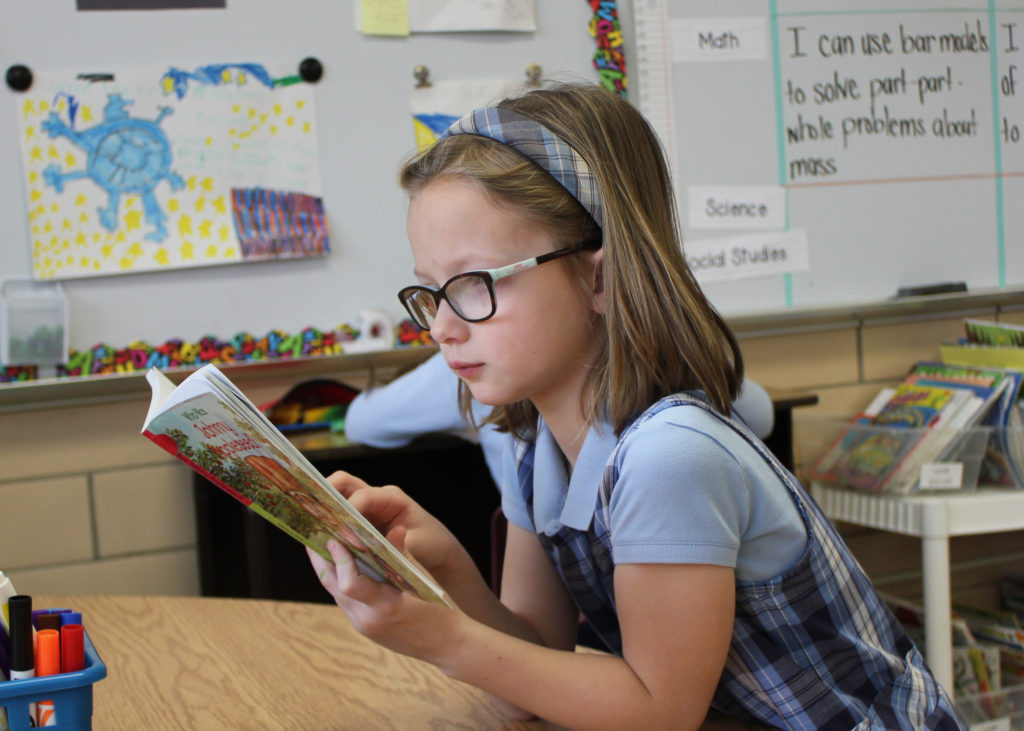
Literacy learning (skills needed to communicate) includes the areas of reading, writing, speaking and listening. While each area has specific concepts and skills that can be taught in isolation, we believe and teach an integrated model, demonstrating the connectedness of these communication skills. We also believe literacy instruction must occur throughout the day in all content areas.. Our writing program is a K-8 program with explicit writing instruction delivered daily in a planned and sequential way, developing within student’s writing skills in a variety of genre. The goal of our reading program is to produce readers who can understand and enjoy complex texts of fiction and non-fiction. We want students to read analytically and critically through the overwhelming amount of information available today in print, both hard copy and digital. The reading program represents a balance between word study (phonics, spelling, vocabulary), guided reading, and independent reading. Reading selections reflect classic and contemporary literature and non-fiction texts that represent “real world” applications. Development of listening and speaking skills occur not only through formal presentations, but also in one-on-one, small group, and whole group settings. Students develop these high value skills by working in informal collaborative groups, as they seek answers to questions; build understandings; and solve problems. Besides faith formation, literacy education is the most important task we have. It is the key to lifelong learning.
Math
Our K-8 math program, Math In Focus®, uses a “Singapore Approach” to build a solid foundation in whole numbers, addition, subtraction, multiplication, division, fractions and decimals.
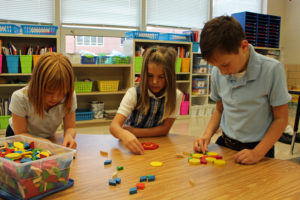
The Math In Focus® math program includes:
- A precise framework of concepts and skills without significant repetition year after year.
- Concepts and skills taught in depth to allow for mastery — with equal emphasis on conceptual understanding and fluency with skills.
- Use of a concrete-to-visual-to-abstract development of concepts using model drawings to connect visual representation to problem solving.
- Emphasis on problem solving – using both multi-step and non-routine problem solving.
Pre-Algebra/Algebra programs are offered at the middle school level. Illinois Virtual School (IVS)* advanced math classes are also offered to qualifying middle school students. Those students may take web-based advanced math offerings during their regular class time. In addition to class time, they have access to the courses at any time for additional study and advancement. The math teacher monitors and supports student progress. *The Illinois Virtual School provides students with high quality courses for grades 5-12 taught by teachers who are federally designated as experts in their field and understand the dynamics of online learning. It offers online course options for students who may have scheduling conflicts, want enrichment opportunities, need Advanced Placement courses, or have credit recovery needs.
Physical Education
Learning efficiency is possible only when coupled with a healthy lifestyle. The mission of St. Philomena Physical Education Department is to ensure that all students acquire the knowledge, combined with social and physical skills that enable them to maintain a healthy, active lifestyle.
This mission to ”Energize and Educate Students for Healthy Lifestyles” is done using the following belief statements:
- Physical education will challenge students, not categorize them.
- Physical education will strengthen the self-concept of each individual.
- Physical education teaches students the need to invest in themselves in order to see a return.
Developmentally appropriate movement skills and concepts are taught and reinforced continually; however, the heart of teaching physical education at St. Philomena focuses on teaching the skills of life from the skills of games. The result will be students that personally value and invest in their own physical activity and health.
Project Based Learning
Project Based Learning allows students to gain knowledge and skills by working over an extended amount of time to investigate and respond to an authentic problem or question.
Project-based learning is integrated throughout the instructional program. Projects are focused on student learning goals and include Essential Project Design Elements:
- Key Knowledge, Understanding, and Success Skills
- Challenging Problem or Question
- Sustained Inquiry
- Authenticity
- Student Voice & Choice
- Reflection
- Critique & Revision
- Public Product
Social Studies
The social studies curriculum follows the C3 Framework and is driven by shared principles about high quality social studies education.
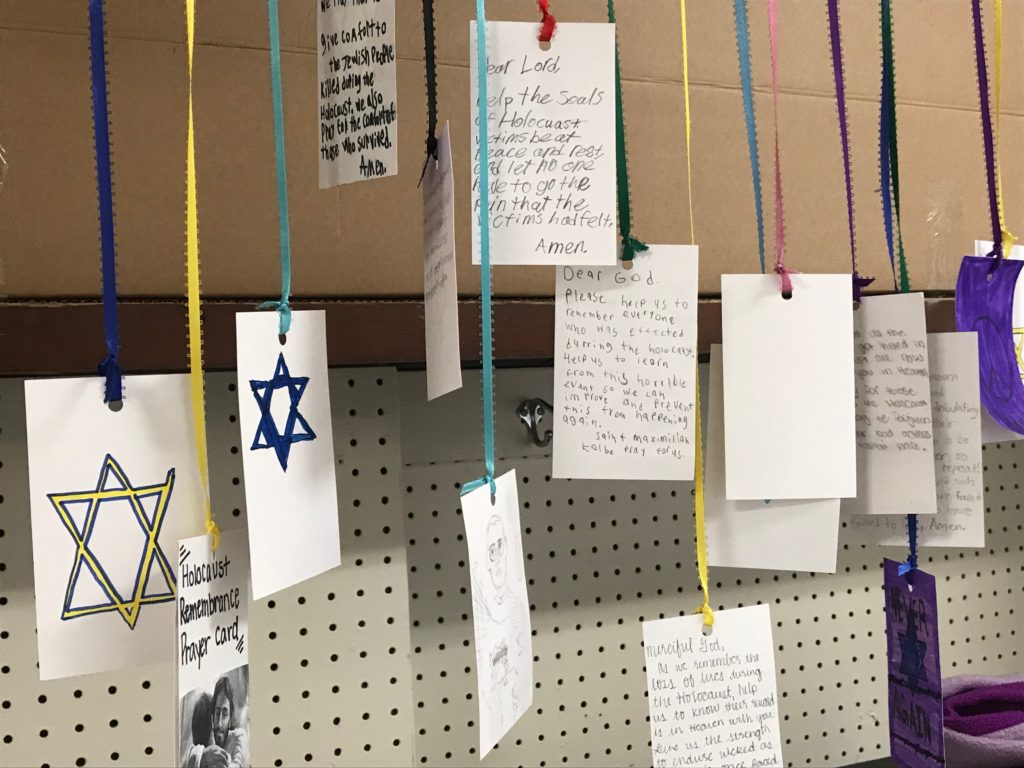
The social studies curriculum in K-5 utilizes an interactive online program designed to teach students about the world around them and how our cultures were created through interesting and engaging activities and lessons. The social studies curriculum in grades sixth through eighth follows the C3 Framework and is driven by the following shared principles about high quality social studies education:
- Social studies prepares young people for college, careers, and civic life.
- Inquiry is at the heart of social studies.
- Social studies involves interdisciplinary applications and welcomes integration of the arts and humanities.
- Social studies is composed of deep and enduring understandings, concepts, and skills from the disciplines. Social studies emphasizes skills and practices as preparation for democratic decision-making.
- Social studies education should have direct and explicit connections to the Illinois State Standards for English Language Arts.
STEAM
STEAM allows students to connect their learning in the critical areas of science, technology, engineering, and math with arts practices, elements, design principles, and standards. STEAM encourages wonder, critique, inquiry, and innovation.
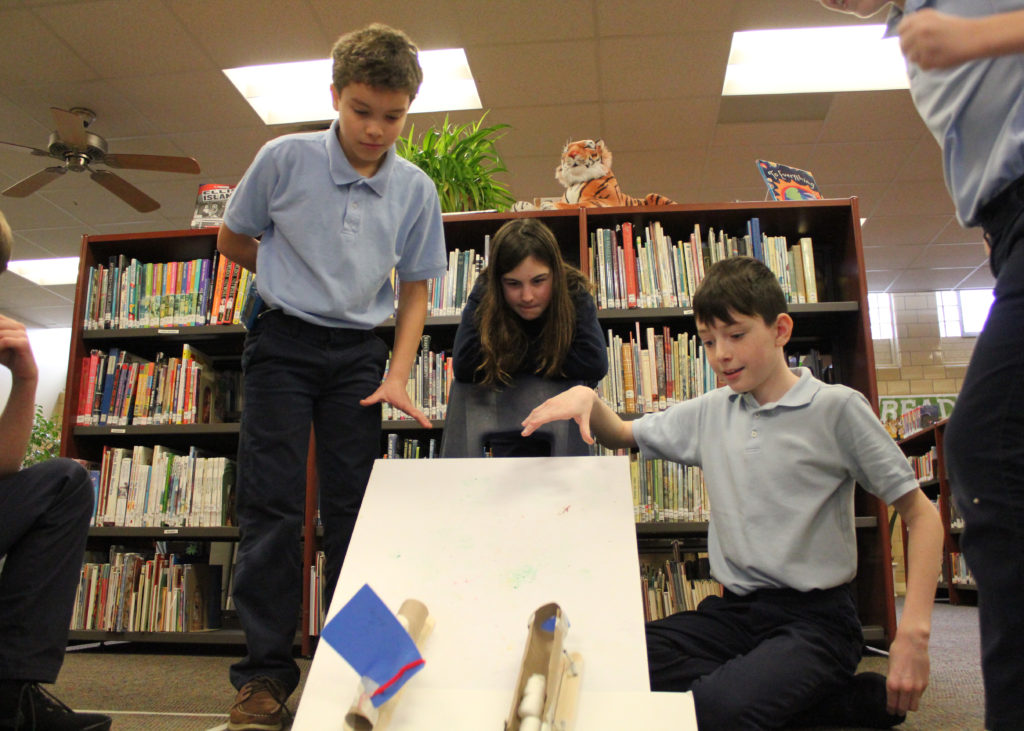
Using STEAM strategies gives St. Philomena students opportunities to inquire, investigate, innovate and collaborate, better preparing them for the 21st Century workforce. Our newly renovated STEAM Lab encourages our students to become creators, makers, and problem-solvers. The lab features:
- Lego Robotics
- 3D Printer
- zSpace Virtual Reality Lab
- Video Production
- Maker Spaces
Technology
Technology allows us to transform our learning environments and better prepare our students for global learning in this digital age.

To maximize learning opportunities in all content areas at St. Philomena, we embed technology throughout the curriculum as a tool of learning. Guiding our technology curriculum design are the National Educational Technology Standards and Performance Indicators for Students developed by the International Society for Technology in Education. A primary focus of our technology education is to develop within our students an understanding of responsible digital citizenship, students who understand and practice safe, legal, and responsible use of information and technology. To ensure access to technology learning opportunities, St. Philomena provides a variety of supportive hardware.
- Smart™ Boards (interactive whiteboards) and document cameras in every classroom.
- COWs (Computers On Wheels laptop mobile labs) in each classroom as well as the library
- 1 to 1 Chromebooks in grades 3-8
- iPads in grades K-2
- Wireless school campus
- Use of Google for Education Apps including Google Classroom to provide students and teachers the opportunity to collaborate, communicate, and provide prompt feedback
- Every teacher has a laptop to facilitate instructional planning and parent communication.



